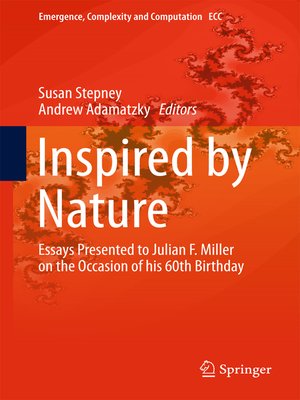Inspired by Nature
ebook ∣ Essays Presented to Julian F. Miller on the Occasion of his 60th Birthday · Emergence, Complexity and Computation
By Susan Stepney

Sign up to save your library
With an OverDrive account, you can save your favorite libraries for at-a-glance information about availability. Find out more about OverDrive accounts.
Find this title in Libby, the library reading app by OverDrive.



Search for a digital library with this title
Title found at these libraries:
| Library Name | Distance |
|---|---|
| Loading... |
This book is a tribute to Julian Francis Miller's ideas and achievements in computer science, evolutionary algorithms and genetic programming, electronics, unconventional computing, artificial chemistry and theoretical biology. Leading international experts in computing inspired by nature offer their insights into the principles of information processing and optimisation in simulated and experimental living, physical and chemical substrates. Miller invented Cartesian Genetic Programming (CGP) in 1999, from a representation of electronic circuits he devised with Thomson a few years earlier. The book presents a number of CGP's wide applications, including multi-step ahead forecasting, solving artificial neural networks dogma, approximate computing, medical informatics, control engineering, evolvable hardware, and multi-objective evolutionary optimisations. The book addresses in depth the technique of 'Evolution in Materio', a term coined by Miller and Downing, using a range of examples of experimental prototypes of computing in disordered ensembles of graphene nanotubes, slime mould, plants, and reaction diffusion chemical systems. Advances in sub-symbolic artificial chemistries, artificial bio-inspired development, code evolution with genetic programming, and using Reed-Muller expansions in the synthesis of Boolean quantum circuits add a unique flavour to the content. The book is a pleasure to explore for readers from all walks of life, from undergraduate students to university professors, from mathematicians, computer scientists and engineers to chemists and biologists.







